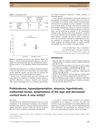 4 citations,
December 2020 in “Neuropsychiatric Disease and Treatment”
4 citations,
December 2020 in “Neuropsychiatric Disease and Treatment” Women with skin conditions who have body image concerns often experience mental health issues and a lower quality of life.
[object Object]  2 citations,
January 2017
2 citations,
January 2017 PCOS is a common hormonal disorder in women that can lead to various health issues and requires comprehensive management.
 January 2013 in “Journal of dermatology”
January 2013 in “Journal of dermatology” A new medical syndrome may include skin changes, hair loss, sweating issues, bone malformations, leg swelling, and low cortisol.
 88 citations,
April 2017 in “Journal of Pediatric and Adolescent Gynecology”
88 citations,
April 2017 in “Journal of Pediatric and Adolescent Gynecology” The document concludes that early diagnosis and treatment of Congenital Adrenal Hyperplasia are crucial for preventing serious health issues and improving patient outcomes.
 38 citations,
November 2012 in “Expert Opinion on Drug Safety”
38 citations,
November 2012 in “Expert Opinion on Drug Safety” Common acne treatments can cause various side effects, like skin irritation and more serious issues, but combination therapies are often more effective and better tolerated.
 27 citations,
December 2016 in “Dermatology and Therapy”
27 citations,
December 2016 in “Dermatology and Therapy” Certain skin conditions can indicate insulin resistance and should prompt lifestyle changes and medical treatment to manage underlying health issues.
 8 citations,
June 2021 in “Journal of Cosmetic Dermatology”
8 citations,
June 2021 in “Journal of Cosmetic Dermatology” The review found that COVID-19 can cause skin problems, including rashes and issues from wearing PPE, and suggests more research and protective measures for healthcare workers.
 5 citations,
February 2010 in “Expert Review of Dermatology”
5 citations,
February 2010 in “Expert Review of Dermatology” Treating both the mind and skin together, especially by managing stress, can greatly improve outcomes for skin disorders linked to psychological issues.
 2 citations,
January 2022 in “Aesthetic surgery journal. Open forum”
2 citations,
January 2022 in “Aesthetic surgery journal. Open forum” Aesthetic surgery can worsen depression and anxiety, especially in those with existing mood issues.
 June 2024 in “Georgetown medical review”
June 2024 in “Georgetown medical review” Finasteride treats hair loss but may cause low libido, erectile issues, and depression.
 January 2011 in “Healthcare Informatics Research”
January 2011 in “Healthcare Informatics Research” Hair loss is significantly linked to symptoms like dry hair, scalp issues, addiction to tobacco or coffee, anxiety, and digestive problems.
 October 2019 in “International journal of clinical & experimental dermatology”
October 2019 in “International journal of clinical & experimental dermatology” Female pattern hair loss greatly affects quality of life, especially in younger patients, those with the condition for a long time, and those with mental health issues. A more comprehensive treatment approach is suggested.
 883 citations,
August 2016 in “Nature Reviews Disease Primers”
883 citations,
August 2016 in “Nature Reviews Disease Primers” Polycystic Ovary Syndrome (PCOS) is a common condition in women that can cause metabolic, reproductive, and psychological issues, and requires lifestyle changes and medication for management.
 414 citations,
August 2005 in “The Journal of Clinical Endocrinology and Metabolism”
414 citations,
August 2005 in “The Journal of Clinical Endocrinology and Metabolism” Polycystic ovary syndrome costs the U.S. over $4 billion a year, mainly from treating related health issues.
 144 citations,
July 2015 in “Clinical, Cosmetic and Investigational Dermatology”
144 citations,
July 2015 in “Clinical, Cosmetic and Investigational Dermatology” Alopecia areata is a common autoimmune disease affecting about 2% of people, causing significant disability and often associated with mental health issues and other autoimmune conditions.
 110 citations,
January 2014 in “The Journal of Sexual Medicine”
110 citations,
January 2014 in “The Journal of Sexual Medicine” Testosterone treatment in trans men increases body and facial hair and may lead to hair loss over time, but severe skin issues are rare.
 69 citations,
November 2010 in “Middle East Fertility Society Journal”
69 citations,
November 2010 in “Middle East Fertility Society Journal” PCOS affects women's health by increasing the risk of diabetes, heart disease, and reproductive issues.
 21 citations,
April 2019 in “Endocrinology and Metabolism Clinics of North America”
21 citations,
April 2019 in “Endocrinology and Metabolism Clinics of North America” Transgender patients need proper skin care, especially when undergoing hormone treatments, to manage issues like acne and hair loss.
 7 citations,
January 2021 in “Biology”
7 citations,
January 2021 in “Biology” Some COVID-19 patients have different skin problems, which might be the only sign of the virus or related to other health issues.
 7 citations,
May 2014 in “Clinical practice”
7 citations,
May 2014 in “Clinical practice” Cooling the scalp may prevent hair loss from chemotherapy, hair often grows back after treatment, and nail issues usually improve after stopping the drug.
 2 citations,
July 2014 in “Irish Journal of Medical Science”
2 citations,
July 2014 in “Irish Journal of Medical Science” The meeting discussed medical findings, including benefits of certain treatments for cancer and heart conditions, and highlighted issues like poor adherence to preventive measures and skill gaps among interns.
 1 citations,
January 2018 in “International Journal of Web Based Communities”
1 citations,
January 2018 in “International Journal of Web Based Communities” Creators of YouTube 'bro-science' baldness videos are driven by a need to share and persuade, often emphasizing authenticity and community building, while navigating trust issues related to commercial ties.
 1 citations,
May 2017 in “InTech eBooks”
1 citations,
May 2017 in “InTech eBooks” Telogen Effluvium is a common hair loss condition that can be short-term or long-lasting and is often caused by stress, illness, or nutritional issues.
 January 2012 in “S. Karger AG eBooks”
January 2012 in “S. Karger AG eBooks” The document concludes that transsexual individuals often experience improved quality of life after transitioning, despite higher risks of psychiatric issues and mortality.
 10 citations,
January 2016 in “Dermatologic Clinics”
10 citations,
January 2016 in “Dermatologic Clinics” Some acne medications have side effects; doctors should educate patients and may not need to do frequent lab tests for all.
 61 citations,
January 2013 in “Indian Journal of Dermatology, Venereology and Leprology”
61 citations,
January 2013 in “Indian Journal of Dermatology, Venereology and Leprology” Hair usually grows back 1-3 months after treatment for anagen effluvium, and children with Loose Anagen Hair Syndrome often improve by adolescence.
 3 citations,
November 2018 in “Oncology issues”
3 citations,
November 2018 in “Oncology issues” Cancer survivors often experience worse skin problems from treatment than expected, and working with dermatologists could help improve their condition.

Low Vitamin D, Vitamin B12, and iron levels, as well as thyroid issues, are strongly linked to premature greying of hair, which also negatively affects quality of life.
[object Object]  April 2021 in “European journal of medical and health sciences”
April 2021 in “European journal of medical and health sciences” The pandemic stress may have increased alopecia cases in Bangladesh.
 214 citations,
March 1993 in “Archives of Dermatology”
214 citations,
March 1993 in “Archives of Dermatology” Telogen effluvium is a reversible hair loss condition that requires a detailed diagnosis and often resolves on its own.






























